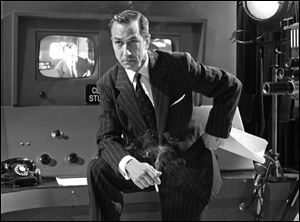
Movie review: Good Night and Good Luck *****
11/4/2005
David Straithairn stars as CBS newsman Edward R. Murrow, who worked to find evidence to bring down Sen. Joseph McCarthy.
One of the most striking elements of Good Night, and Good Luck is not that it is filmed in black and white. After the first few minutes, the lack of color shifts from affectation to acceptance, and later in the movie, it transforms to a necessity.
What jumps off the screen is the sheer erudition of early television's broadcast newsmen, notably Edward R. Murrow, who "set standards of excellence that remain unsurpassed." That's on a plaque in the lobby of CBS headquarters in New York, where Murrow worked from 1935 to 1961, according to the Museum of Broadcast Communications.
With a distinct sense of time and place and a poetic literacy, Good Night, and Good Luck follows the fall of Sen. Joseph McCarthy, whose determination to root out communism in government and the arts became a breathtakingly broad witch-hunt that ruined countless lives in the 1950s.
By focusing on this narrow slice of history, writer and director George Clooney achieves three goals.
One is a biography of Murrow. Although the movie is only 93 minutes long, it gives us a sure sense that here is a man driven to excel, to find the stories beneath the news, not for personal gain but because he believed in the importance, the necessity of the work. You don't have to know that Murrow became famous in the late 1930s, when he reported from the rooftops of London during the Battle of Britain. All you have to see is the look of disgust that flits across his face after a shallow interview with Liberace for CBS' Person to Person program. This is a man who believed in the medium of television, in its ability to educate and make lives better.
The second is a portrait of early television: newsrooms made up almost exclusively of white males, the constant cigarette smoking, the sheer claustrophobia of working amid huge, bulky equipment, the clatter of typewriters, the chatter of projectors showing newsreels.
The third is a return to that period in history, more than half a century ago, when the mere hint of disagreeing with the government was branded as disloyal or even traitorous. History often seems quaint, especially when modern television turns it into reality shows and movies are more interested in effects than facts. But Clooney's skillful use of old newsreels imbue Good Night, and Good Luck with credibility, and Clooney and his staff take care not to destroy that feeling. And if the movie hints at more than a few parallels with today's government, that's probably intentional, too.
Oh, Clooney achieves a fourth goal as well: Good Night, and Good Luck is unceasingly fascinating.
The movie's title is the sentence Murrow used to end his news program called See it Now.
In interviews, Clooney has said he toyed with the idea of playing Murrow, but thought his screen persona was too lightweight, too happy-go-lucky for the role. He's right; his choice of David Strathairn borders on genius.
Strathairn is a solid actor who is never without a sense of gravity, whether he's playing Meryl Streep's husband in The River Wild, a mentally challenged theater usher in Lost in Yonkers, or a mysterious millionaire in L.A. Confidential. Here, he even looks like Murrow, and his behavior is utterly believable.
Clooney co-stars as Murrow's friend and producer Fred Friendly. Because Friendly was not a public figure, spending most of his career behind the scenes, it's far easier to accept Clooney's easygoing traits in the character.
Although the linear plot of Good Night, and Good Luck follows Murrow and Friendly as they try to find the evidence to bring down McCarthy - and keep William Paley, head of CBS, satisfied that the results of the story will be worth the cost - the film is not one-dimensional.
With his minor characters - the casting is uniformly excellent - Clooney dresses the film up with a sense of time and place. There are Joe and Shirley (Robert Downey, Jr., and Patricia Clarkson), who hide the fact that they're married so that both can remain working at CBS, which has a policy against employing married couples. There is Don Hollenbeck (Ray Wise), a CBS newscaster and friend and supporter of Murrow, who is the particular target of a vitriolic newspaper columnist. Jeff Daniels plays Sig Mickelson, the president of CBS News, who supports Murrow's cause but must try to placate the advertisers as well as Paley.
The one weak area of the film is almost funny. It is McCarthy himself. This much-feared man of the 1950s is almost a buffoon; his performance would be nearly unbelievable if it weren't for the fact that Clooney splices in actual footage of McCarthy at the Senate hearings and in a filmed rebuttal of Murrow's See It Now allegations.
Here is where Clooney's decision to film in black and white makes perfect sense: The use of the historical footage is seamless. There is no sense that we're watching something forced.
Good Night, and Good Luck is not perfect. There is no sense that McCarthy had started his downward slide when Murrow took aim at him, no mention of the fact that other journalists were targeting him. But those are minor complaints in a very big picture.
Though the subject matter is serious, Good Night, and Good Luck bristles with humor and intelligence. You want "Must See TV"? Here it is.
Contact Nanciann Cherry at: ncherry@theblade.com
or 419-724-6130.